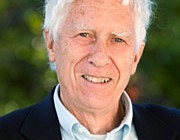Wolterstorff’s Dialogical Imperative
In October 1998 eminent Christian philosopher Nicholas Wolterstorff (Yale University, emeritus) delivered a lecture entitled “Tertullian’s Enduring Question”. The lecture was subsequently printed in a publication called The Cresset in 1999 and it is now available as chapter 13 in the first volume of Wolterstorff’s collected papers. In the lecture Wolterstorff reflects on Tertullian’s famous question… Read More »




